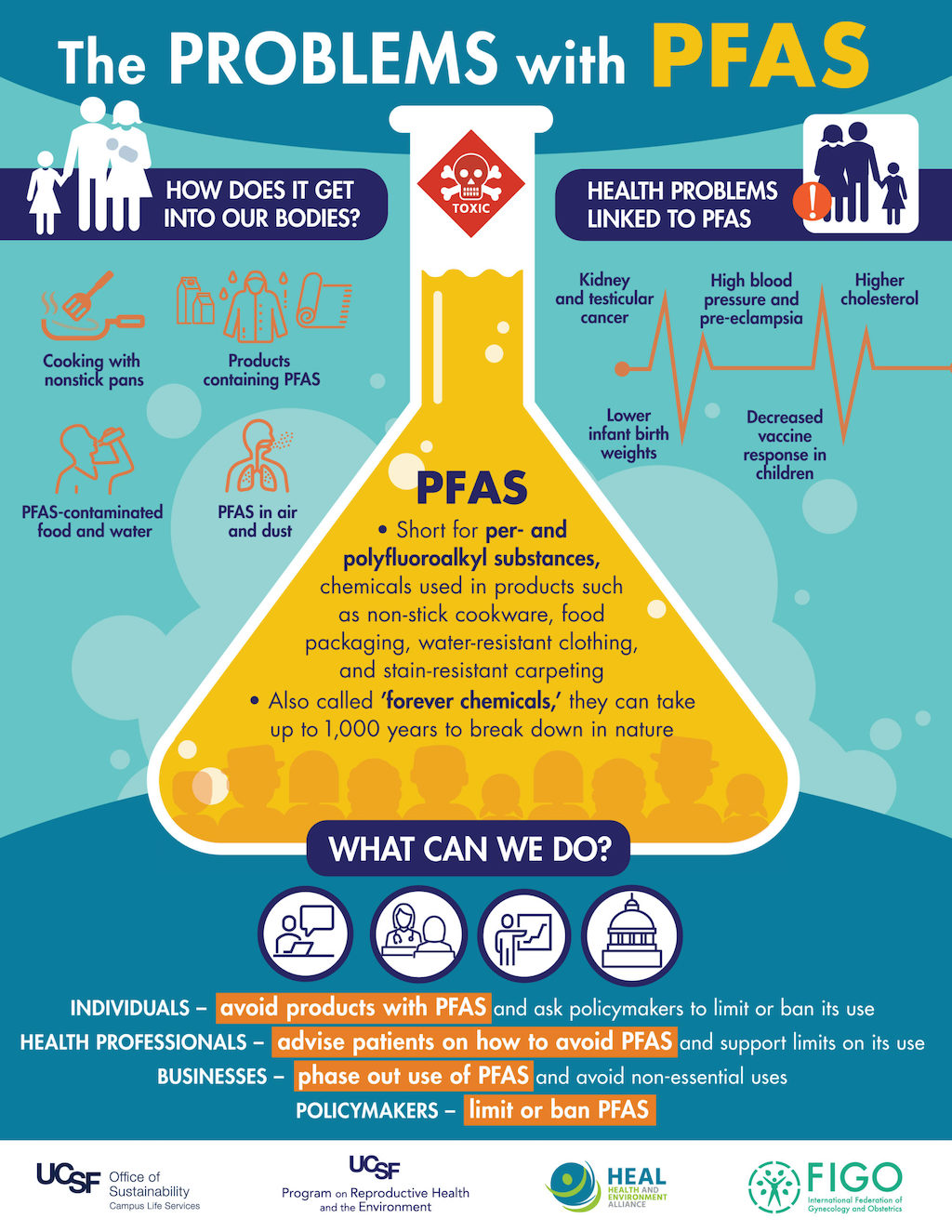4 Mins Read
Health professionals and experts have urged for a global phase-out of PFAS, as more evidence over the harmful effects of these “forever chemicals” comes to light. The call, made by a global coalition of women’s health organisations under the International Federation of Gynecology and Obstetrics (FIGO), says that existing policies are “failing to control widespread human exposures to this large class of hazardous compounds”.
Women’s health groups under FIGO have called for the global phasing out of PFAS, known as “forever chemicals” because they never truly break down in the environment and have been proven to accumulate in our bodies. PFAS are currently widely used in everyday consumer products, including food packaging and containers, water-resistant clothing, cosmetics and non-stick pans.
The widespread use of synthetic compounds and build-up in human tissue could lead to potentially harmful long-term effects that are still not fully understood, though a whole bed of toxicological and epidemiological research around existing and older PFAS already indicates that exposure to these substances “constitute a more-than-plausible risk of harm,” said FIGO.

FIGO’s position reflects a review of the scientific literature on PFAS, as well as our embrace of our social responsibility to protect the public from exposure to harm when scientific investigation has found a plausible risk to children, adolescent girls, pregnant women and other adult women.
FIGO
“PFAS exposure in children, including perinatal exposure, is associated with impaired kidney and immune function, altered production of thyroid hormone and lipid levels, alterations in the onset of puberty, and adverse effects on the development of the brain and nervous system.”
Research also supports the association between PFAS accumulation and kidney disease, liver damage, cancer, neurological damage, autoimmune disorders and developmental issues, as well as a link between PFAS and declining sperm counts, a trend leading epidemiologist Dr. Shanna Swan says amounts to a fertility crisis that “threatens human survival”.
Most recently, a new study of U.S. mothers alarmingly detected PFAS in every single sample of breast milk, at nearly 2,000 times the level considered safe in drinking water. Results also indicated that both currently-used and phased-out PFAS are contaminating breast milk, potentially exposing infants to the known and unknown impacts of the toxins.
It suggests that the updated “short chain” class of PFAS developed by the chemicals industry in recent years, which claim to be “less harmful” and do not cause accumulation in bodies, may still lead to many of the adverse impacts associated with all classes of PFAS.
Investigations have also revealed that industry giants like DuPont and Daikin knowingly continued to produce the new generation of 6:2 FTOH compounds despite internal company animal studies indicating toxicity.
“FIGO’s position reflects a review of the scientific literature on PFAS, as well as our embrace of our social responsibility to protect the public from exposure to harm when scientific investigation has found a plausible risk to children, adolescent girls, pregnant women and other adult women,” said the body.

Because of the extremely high persistence of PFAS, that necessarily means ending their existing uses, as well as shutting down the pipeline of new PFAS still being developed and marketed.
Dr. Anna Reade & Dr. David Wallinga, NRDC
In collaboration with experts at the nonprofit Natural Resources Defense Council (NRDC), staff scientist Dr. Anna Reade and senior health officer Dr. David Wallinga, FIGO has also released a fact sheet to provide the public with more information about the health threat that PFAS are posing – particularly to women, pregnant women, children and infants.
“Clearly, current policies to manage chemicals are failing to control widespread human exposures to this large class of hazardous compounds,” wrote Dr. Reade and Dr. Wallinga in an article on the call to phase-out PFAS.
“While already robust, the evidence of harm due to PFAS exposure will only keep growing so long as they are being marketed and used.”
Experts have outlined several recommendations to policymakers, including prioritising the phase-out of all non-essential uses and manufacturing of PFAS, particularly in products that are likely to expose pregnant women and children, as well as requiring producers to make information more transparent and available to the public.
It also calls for greater regulatory assessment over PFAS as a class, and greater investment into safer alternatives.
“Medical experts recognise that preventing these exposures in the first place must be a part of the solution,” said Dr. Reade and Dr. Wallinga.
“Because of the extremely high persistence of PFAS, that necessarily means ending their existing uses, as well as shutting down the pipeline of new PFAS still being developed and marketed.”
Lead image courtesy of Unsplash.




